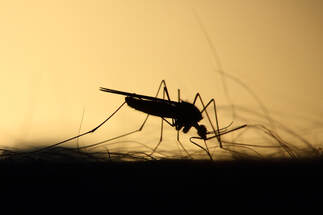|
Written by Neha Mukherjee Edited by Felix Green, PhD
Now scientists are asking why this is occuring. Why here? Why now? The answer could lie in climate change. Alex Kuffner of the Providence Journal took an in-depth look into this possible correlation and found that “Scientists caution that it is difficult to draw a definitive connection between climate change and the spread of EEE. But they say it’s conceivable that changes in temperature and rainfall could lead to more outbreaks of the virus” [1]. As the article explains, the hotter winters mean longer ideal temperatures for mosquitoes, which in turn leads to higher survival rates among insects [1]. As evidence of this, Rhode Island temperature has increased 3.8 degrees Fahrenheit since 1895, allowing the mosquito population to expand significantly [1]. The increase in rain in the spring and summer also makes for an ideal environment for mosquito survival. The fact that summers have become longer also allows for more virus transfer from birds, the original hosts, into humans [1]. These facts combined point to the correlation between climate change and the increase in EEE rates in New England, yet causation cannot yet be claimed, as many other factors are also involved [1]. The Rhode Island Department of Health is aware of the threat and is taking active measures to stop the spread of disease, including Aerial Mosquito spraying. They also advise people to stay indoors, use bug spray, and limit proximity to stagnant water; however, this it may not be enough to fully protect the population [3]. In the long term, it is the root cause of the issue that needs to be solved and not just the symptoms. If climate change is indeed a factor in the rise in EEE infections and other mosquito-borne illnesses—and given the correlation between rising temperatures and mosquito populations, it seems highly likely that it is—then we need a solution that addresses this. This is just one example where the effort to fix a health problem focuses on symptoms rather than causes. It is essential that we change our mindset and invest in programming to find the root cause of issues in order to promote a healthier society [1] Kuffner AK. Is Climate Change to Blame for New England’s EEE Outbreak. Providence Journal [Internet}. 2019 Sept 27 [Cited 2019 Oct 5] Available from: https://www.providencejournal.com/news/20190927/is-climate-change-to-blame-for-new-englands-eee-outbreak
[2] Furlow JF. Timeline: Human cases of EEE in Massachusetts, 2019. WWLP [Internet]. 2019 Sept 8 [Cited 2019 Oct 5] Available from: https://www.wwlp.com/news/top-stories/timeline-human-cases-of-eee-virus-in-massachusetts-2019/ [3] State of Rhode Island Department of Health [Internet] [Cited 2019 Oct5 5]. Available from: http://www.health.ri.gov
0 Comments
Leave a Reply. |

